- Home
- Elif Shafak
The Forty Rules of Love Page 10
The Forty Rules of Love Read online
Page 10
It was only a few years earlier that Ella had stopped hating her aging mother, and though the two of them had been on good terms lately, the truth was, deep inside she still felt ill at ease when she remembered the past.
“Mom! … Earth to Mom! Earth to Mom!”
Ella heard a ripple of giggles and whispers behind her shoulder. When she turned around, she saw four pairs of eyes watching her with amusement. Orly, Avi, Jeannette, and David had for once all come to breakfast at the same time and were now standing side by side inspecting her as if she were an exotic creature. From the way they looked, it seemed they had been standing there for a while, trying to get her attention.
“Good morning, you all.” Ella smiled.
“How come you didn’t hear us?” Orly asked, sounding genuinely surprised.
“You seemed so absorbed in that screen,” David said without looking at her.
Ella’s gaze followed her husband’s, and there on the open screen in front of her, she saw Aziz Z. Zahara’s e-mail shining dimly. In a flash she closed her laptop, without waiting for it to shut down.
“I’ve got a lot of reading to do for the literary agency,” Ella said, rolling her eyes. “I was working on my report.”
“No you were not! You were reading your e-mails,” Avi said, his face serious, matter-of-fact.
What was it in teenage boys that made them so eager to detect everyone’s flaws and lies? Ella wondered. But, to her relief, the others didn’t seem interested in the subject. In fact, they were all looking somewhere else now, focused on the kitchen counter.
It was Orly who turned to Ella, voicing the question for them all. “Mom, how come you haven’t made us any breakfast this morning?”
Now Ella turned to the counter and saw what they had seen. There was no coffee brewing, no scrambled eggs on the stove, no toast with blueberry sauce. She nodded repeatedly as if agreeing with an inner voice that spoke an undeniable truth.
Right, she thought, how come she had forgotten the breakfast?
PART TWO
Water
THE THINGS THAT ARE FLUID, CHANGING, AND UNPREDICTABLE
Rumi
KONYA, OCTOBER 15, 1244
Bright and plump, the gorgeous full moon resembled a massive pearl hanging in the sky. I got up from the bed and looked out the window into the courtyard, awash in moonlight. Even seeing such beauty, however, did not soothe the pounding of my heart or the trembling of my hands.
“Effendi, you look pale. Did you have the same dream again?” whispered my wife. “Shall I bring you a glass of water?”
I told her not to worry and to go back to sleep. There was nothing she could do. Our dreams were part of our destiny, and they would run their course as God willed it. Besides, there must be a reason, I thought, that every night for the last forty days I had been having the same dream.
The beginning of the dream differed slightly each time. Or perhaps it was always the same but I entered it from a different gate each evening. On this occasion I saw myself reading the Qur’an in a carpeted room that felt familiar but was like no place I had been before. Right across from me sat a dervish, tall, thin, and erect, with a veil on his face. He was holding a candelabrum with five glowing candles providing me with light so that I could read.
After a while I lifted my head to show the dervish the verse I was reading, and only then did I realize, to my awe, that what I thought was a candelabrum was in fact the man’s right hand. He had been holding out his hand to me, with each one of his fingers aflame.
In panic I looked around for water, but there was none in sight. I took off my cloak and threw it on the dervish to extinguish the flames. But when I lifted the cloak, he had vanished, leaving only a burning candle behind.
From this point onward, it was always the same dream. I started to look for him in the house, searching every nook and cranny. Next I ran into the courtyard, where the roses had blossomed in a sea of bright yellow. I called out left and right, but the man was nowhere to be seen.
“Come back, beloved. Where are you?”
Finally, as if led by an ominous intuition, I approached the well and peered down at the dark waters churning below. At first I couldn’t see anything, but in a little while the moon showered me in its glittering light and the courtyard acquired a rare luminosity. Only then did I notice a pair of black eyes staring up at me with unprecedented sorrow from the bottom of the well.
“They killed him!” somebody shouted. Perhaps it was me. Perhaps this was what my own voice would sound like in a state of infinite agony.
And I screamed and screamed until my wife held me tight, drew me to her bosom, and asked softly, “Effendi, did you have the same dream again?”
After Kerra went back to sleep, I slipped into the courtyard. In that moment I had the impression that the dream was still with me, vivid and frightening. In the stillness of the night, the sight of the well sent a shiver down my spine, but I couldn’t help sitting next to it, listening to the night breeze rustle gently through the trees.
At times like these, I feel a sudden wave of sadness take hold of me, though I can never tell why. My life is complete and fulfilled, in that I have been blessed with the three things I hold most dear: knowledge, virtue, and the capability to help others find God.
At age thirty-eight, I have been given by God more than I could ever have asked for. I have been trained as a preacher and a jurist and initiated into The Science of Divine Intuition—the knowledge given to prophets, saints, and scholars in varying degrees. Guided by my late father, educated by the best teachers of our time, I have worked hard to deepen my awareness with the belief that this was the duty God had assigned me.
My old master Seyyid Burhaneddin used to say I was one of God’s beloved, since I was given the honorable task of delivering His message to His people and helping them differentiate right from wrong.
For many years I have been teaching at the madrassa, discussing theology with other sharia scholars, instructing my disciples, studying law and hadiths, giving sermons every Friday at the biggest mosque in town. I have long lost track of the number of students I have tutored. It is flattering to hear people praise my preaching skills and tell me how my words changed their lives at a time when they most needed guidance.
I am blessed with a loving family, good friends, and loyal disciples. Never in my life have I suffered destitution or scarcity, although the loss of my first wife was devastating. I thought I would never get married again, but I did, and thanks to Kerra I have experienced love and joy. Both of my sons are grown, although it never ceases to amaze me to see how different from each other they turned out to be. They are like two seeds that, though planted side by side in the same soil and nourished with the same sun and water, have blossomed into completely different plants. I am proud of them, just as I am proud of our adopted daughter, who has unique talents. I am a happy, satisfied man both in my private life and in the community.
Why, then, do I feel this void inside me, growing deeper and wider with each passing day? It gnaws at my soul like a disease and accompanies me wherever I go, as quiet as a mouse and just as ravenous.
Shams
KONYA, OCTOBER 17, 1244
Before passing through the gates of a town I’ve never visited, I take a minute to salute its saints—the dead and the living, the known and the hidden. Never in my life have I arrived at a new place without getting the blessing of its saints first. It makes no difference to me whether that place belongs to Muslims, Christians, or Jews. I believe that the saints are beyond such trivial nominal distinctions. A saint belongs to all humanity.
So when I saw Konya for the first time from a distance, I did what I always did. But something unusual happened next. Instead of greeting me back and offering their blessings, as they always did, the saints remained as silent as broken tombstones. I saluted them again, more loudly and assertively this time, in case they had not heard me. But once again there followed silence. I realized that the saints had he
ard me, all right. They just weren’t giving me their blessing.
“Tell me what’s wrong?” I asked the wind so that it would carry my words to the saints far and wide.
In a little while, the wind returned with an answer. “O dervish, in this city you’ll find only two extremes, and nothing in between. Either pure love or pure hatred. We are warning you. Enter at your own risk.”
“In that case there is no need to worry,” I said. “As long as I can encounter pure love, that’ll be enough for me.”
Upon hearing that, the saints of Konya gave me their blessing. But I didn’t want to enter the city just yet. I sat down under an oak tree, and as my horse munched on the sparse grass around, I looked at the city looming in the distance. The minarets of Konya glistened in the sun like shards of glass. Every now and then, I heard dogs barking, donkeys braying, children laughing, and vendors yelling at the top of their lungs—ordinary sounds of a city throbbing with life. What kinds of joys and sorrows, I wondered, were being lived at this moment behind closed doors and latticed windows? Being used to an itinerant life, I found it slightly unnerving to have to settle in a city, but I recalled another fundamental rule: Try not to resist the changes that come your way. Instead let life live through you. And do not worry that your life is turning upside down. How do you know that the side you are used to is better than the one to come?
A friendly voice yanked me out of my reverie. “Selamun aleykum, dervish!”
When I turned around, I saw an olive-skinned, brawny peasant with a drooping mustache. He was riding a cart pulled by an ox so skinny that the poor thing looked as if it could at any moment breathe its last.
“Aleykum selam, may God bless you!” I called out.
“Why are you sitting here on your own? If you are tired of riding that horse of yours, I could give you a lift.”
I smiled. “Thanks, but I think I could go faster on foot than with your ox.”
“Don’t sell my ox short,” the peasant said, sounding offended. “He might be old and frail, but he’s still my best friend.”
Put in my place by these words, I jumped to my feet and bowed before the peasant. How could I, a minor element in God’s vast circle of creation, belittle another element in the circle, be it an animal or a human being?
“I apologize to you and your ox,” I said. “Please forgive me.”
A shadow of disbelief crossed the peasant’s face. He stood deadpan for a moment, weighing whether I was mocking him or not. “Nobody ever does that,” he said when he spoke again, flashing me a warm smile.
“You mean apologize to your ox?”
“Well, that, too. But I was thinking nobody ever apologizes to me. It’s usually the other way round. I am the one who says sorry all the time. Even when people do me wrong, I apologize to them.”
I was touched to hear that. “The Qur’an tells us each and every one of us was made in the best of molds. It’s one of the rules,” I said softly.
“What rule?” he asked.
“God is busy with the completion of your work, both outwardly and inwardly. He is fully occupied with you. Every human being is a work in progress that is slowly but inexorably moving toward perfection. We are each an unfinished work of art both waiting and striving to be completed. God deals with each of us separately because humanity is a fine art of skilled penmanship where every single dot is equally important for the entire picture.”
“Are you here for the sermon, too?” the peasant asked with a renewed interest. “It looks like it’s going to be very crowded. He is a remarkable man.”
My heart skipped a beat as I realized whom he was talking about. “Tell me, what is so special about Rumi’s sermons?”
The peasant fell quiet and squinted into the vast horizon for a while. His mind seemed to be everywhere and nowhere.
Then he said, “I come from a village that has had its share of hardships. First the famine, then the Mongols. They burned and plundered every village in their way. But what they did in the big cities was even worse. They captured Erzurum, Sivas, and Kayseri and massacred the entire male population, taking the women with them. I myself have not lost a loved one or my house. But I did lose something. I lost my joy.”
“What’s that got to do with Rumi?” I asked.
Dropping his gaze back to his ox, the peasant murmured tonelessly, “Everyone says if you listen to Rumi preach, your sadness will be cured.”
Personally, I didn’t think there was anything wrong with sadness. Just the opposite—hypocrisy made people happy, and truth made them sad. But I didn’t tell this to the peasant. Instead I said, “Why don’t I join you until Konya, and you’ll tell me more about Rumi?”
I tied my horse’s reins to the cart and climbed in to sit beside the peasant, glad to see that the ox didn’t mind the additional load. One way or the other, it walked the same excruciatingly slow walk. The peasant offered me bread and goat cheese. We ate as we talked. In this state, while the sun blazed in an indigo sky, and under the watchful eyes of the town’s saints, I entered Konya.
“Take good care, my friend,” I said as I jumped off the cart and loosened the reins of my horse.
“Make sure you come to the sermon!” the peasant yelled expectantly.
I nodded as I waved good-bye. “Inshallah.”
Although I was eager to listen to the sermon and dying to meet Rumi, I wanted to spend some time in the city first and learn what the townspeople thought about the great preacher. I wanted to see him through foreign eyes, kind and unkind, loving and unloving, before I looked on him with my own.
Hasan the Beggar
KONYA, OCTOBER 17, 1244
Believe it or not, they call this purgatory on earth “holy suffering.” I am a leper stuck in limbo. Neither the dead nor the living want me among them. Mothers point me out on the streets to scare their misbehaving toddlers, and children throw stones at me. Artisans chase me from their storefronts to ward off the bad luck that follows me everywhere, and pregnant women turn their faces away whenever they set eyes on me, fearing that their babies will be born defective. None of these people seem to realize that as keen as they are to avoid me, I am far keener to avoid them and their pitiful stares.
It is the skin that changes first, becoming thicker and darker. Patches of varying sizes, the color of rotten eggs, appear on the shoulders, knees, arms, and face. There is a lot of stinging and burning in this phase, but then somehow the pain withers away, or else one becomes numb to it. Next the patches start to enlarge and swell up, turning into ugly bulbs. The hands turn to claws, and the face is so deformed as to be unrecognizable. Now that I am nearing the final stages, I cannot close my eyelids anymore. Tears and saliva flow without my control. Six of the nails on my hands have fallen off, and one is on its way. Oddly enough, I still have my hair. I guess I should consider that lucky.
I heard that in Europe lepers are kept outside the city walls. Here they let us live in the city as long as we carry a bell to warn other people of our presence. We are also allowed to beg, which is a good thing, because otherwise we would probably starve. Begging is one of only two ways to survive. The other is praying. Not because God pays special attention to lepers but because for some strange reason people think He does. Hence, as much as they despise us, the townspeople also respect us. They hire us to pray for the sick, the crippled, and the elderly. They pay and feed us well, hoping to squeeze out of our mouths a few extra prayers. On the streets, lepers might be treated worse than dogs, but in places where death and despair loom large, we are the sultans.
Whenever I am hired to pray, I bow my head and make incomprehensible sounds in Arabic, pretending to be absorbed in prayer. Pretend is all I can do, for I don’t think God hears me. I have no reason to believe He does.
Though it is less profitable, I find begging much easier than praying. At least I am not deceiving anyone. Friday is the best day of the week to beg, except when it is Ramadan, in which case the whole month is quite lucrative. The last day of
Ramadan is by far the best time to make money. That is when even the hopeless penny-pinchers race to give alms, keen to compensate for all their sins, past and present. Once a year, people don’t turn away from beggars. To the contrary, they specifically look for one, the more miserable the better. So profound is their need to show off how generous and charitable they are, not only do they race to give us alms, but for that single day they almost love us.
Today could be a very profitable day, too, since Rumi is giving one of his Friday sermons. The mosque is already packed. Those who can’t find a seat inside are lining up in the courtyard. The afternoon is the perfect occasion for panhandlers and pickpockets. And just like me, they are all present here, scattered within the crowd.
I sat down right across from the entrance of the mosque with my back to a maple tree. There was a dank smell of rain in the air, mixed with the sweet, faint tang coming from the orchards far away. I put my mendicant bowl in front of me. Unlike many others in this business, I never have to openly ask for alms. A leper doesn’t need to whine and implore, making up stories about how wretched his life is or how poor his health. Giving people a glimpse of my face has the effect of a thousand words. So I simply uncovered my face and sat back.
In the next hour, a few coins were dropped into my bowl. All were chipped copper. I yearned for a gold coin, with symbols of sun, lion, and crescent. Since the late Aladdin Keykubad had loosened the rules on currency, coins issued by the beys of Aleppo, the Fatimid rulers in Cairo, and the caliph of Baghdad, not to mention the Italian florin, were all pronounced valid. The rulers of Konya accepted them all, and so did the town’s beggars.
Together with the coins, a few dry leaves fell on my lap. The maple tree was shedding its reddish gold leaves, and as a gusty wind blew, quite a number of these made it into my bowl, as if the tree were giving me alms. Suddenly I realized that the maple tree and I had something in common. A tree shedding its leaves in autumn resembled a man shedding his limbs in the final stages of leprosy.

 Black Milk: On Writing, Motherhood, and the Harem Within
Black Milk: On Writing, Motherhood, and the Harem Within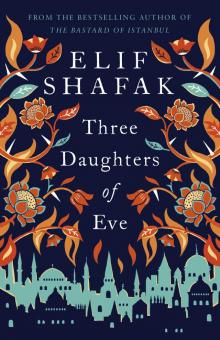 Three Daughters of Eve
Three Daughters of Eve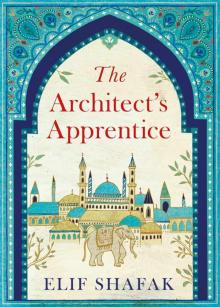 The Architect's Apprentice
The Architect's Apprentice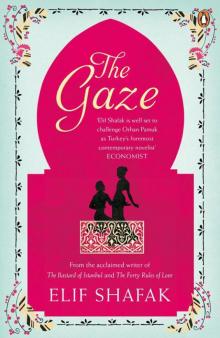 The Gaze
The Gaze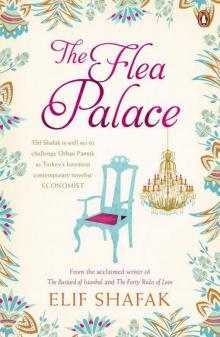 The Flea Palace
The Flea Palace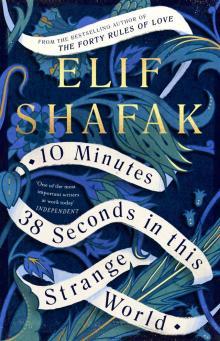 10 Minutes 38 Seconds in this Strange World
10 Minutes 38 Seconds in this Strange World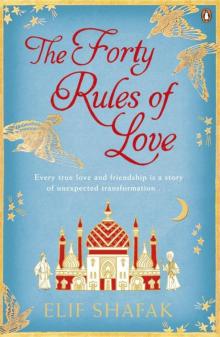 The Forty Rules of Love
The Forty Rules of Love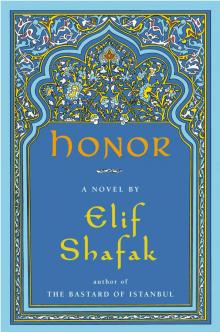 Honor
Honor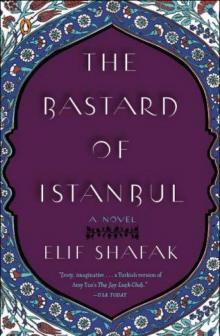 The Bastard of Istanbul
The Bastard of Istanbul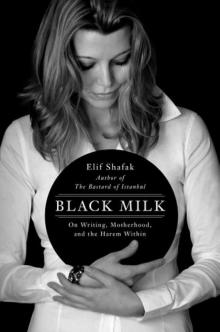 Black Milk
Black Milk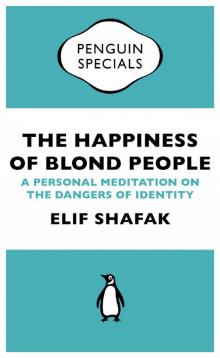 The Happiness of Blond People (Penguin Specials)
The Happiness of Blond People (Penguin Specials)